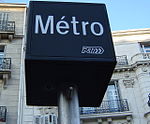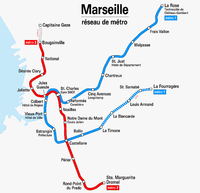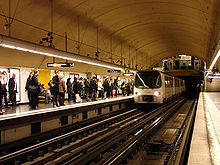- Marseille Metro
-
Métro de Marseille 
Info Locale Marseille, Provence-Alpes-Côte d'Azur Transit type Rapid transit Number of lines 2 Number of stations 30 Daily ridership 708,232 (2009) Operation Began operation 1977 Operator(s) RTM Technical System length 21.7 km (13.5 mi) Track gauge 1,435 mm (4 ft 8 1⁄2 in) System map The Marseille metro serves the City of Marseille. It is a rubber-tyred metro derived from the technology developed by the RATP for Paris Metro and opened at the end of 1977. It comprises two lines, partly underground, with an overall length of 11.8 miles (19 km).
Two extensions are proposed: the first, located on Line 1, is under construction; the second, on Line 2, has reached the stage of preliminary studies.
The Metro is a municipal public utility under the control of the Régie des transports de Marseille.
Contents
Line 1
Line 1 was opened in 1977 from Place Castellane to La Rose (5.8 miles/ 9.4 km and 10 stations) and extended in 1992 to La Timone. It is currently being extended to La Fourragère, and a further extension from La Rose to Chateau Gombert and La Technopôle.
Line 2
The line was opened in 1984 from Bougainville to Sainte-Marguerite Dromel. An extension from Sainte-Marguerite to St-Loup is being studied.
See also
- List of Marseille metro stations
- Marseille tramway
- Transportation in Marseille
- List of metro systems
External links
 Media related to Marseille Metro at Wikimedia Commons
Media related to Marseille Metro at Wikimedia Commons- (French) RTM official website
- (English) Urbanrail.net
Urban guided transit systems in France Métros PresentTramways PresentPlannedFormerAvranches · Bordeaux · Cannes · Caen · Grenoble · Deauville · Fontainebleau · Le Havre · Lyon · Nantes · Nice et Littoral · Paris · Rouen · Saint-Romain-de-Colbosc · Strasbourg · Valenciennes · VersaillesGuided buses PresentPlannedDouai · ParisUrban funiculars PresentFormerBesançonUrban cable cars PresentGrenoblePeople movers Present
This European rapid transit-related article is a stub. You can help Wikipedia by expanding it.


